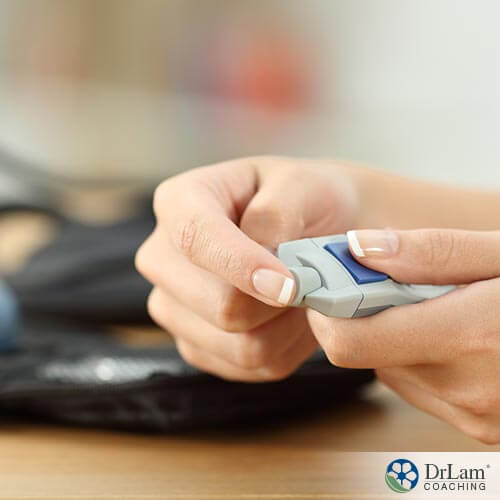To maintain good overall health, it is important to pay greater attention to your blood sugar levels. This is because any changes in your blood sugar levels may be an indication that you are suffering from adrenal fatigue. In fact, during the advanced stages of adrenal fatigue, you may suffer from low blood glucose levels or hypoglycemia. In this case, proper management of your blood sugar levels is needed to stop hypoglycemia symptoms and prevent adrenal exhaustion from becoming far worse.
 Hypoglycemia is a condition wherein a person is suffering from significantly low blood glucose or blood sugar levels. Typically, when you eat food, your body readily breaks down carbohydrates into different types of sugar molecules. One of these is glucose.
Hypoglycemia is a condition wherein a person is suffering from significantly low blood glucose or blood sugar levels. Typically, when you eat food, your body readily breaks down carbohydrates into different types of sugar molecules. One of these is glucose.
Glucose happens to be the body’s main energy source. However, it is not able to enter the cells of most of the body’s tissues without the help of insulin, which is secreted by the pancreas. Insulin allows glucose to properly enter the cells so that cells can be nourished and function properly. Meanwhile, any extra glucose is stored in the muscles and liver in the form of glycogen.
If you have not eaten for hours and your blood sugar drops, the glucagon hormone from the pancreas signals your liver to break down the glycogen and release glucose into your bloodstream. Cortisol can also be released from the adrenal glands to raise blood sugar levels as well. Typically, this results in an elevated blood sugar level in the body. If it doesn’t, it means that you have hypoglycemia, indicating that your blood sugar level is dangerously low.
When suffering from hypoglycemia, you can experience a number of common symptoms. These include shakiness, hunger, dizziness, confusion, anxiety, weakness, irritability, and even irregular heart rhythms. As the condition becomes worse, it can even lead to confusion, visual disturbances, seizures, and even loss of consciousness.
While having low blood glucose levels can be related to diabetes, a person may also experience this condition without the disease. This is because hypoglycemia can be caused by a number of factors. For example, certain types of medication can trigger this condition. This effect has been seen with the administration of quinine, which is typically used for malaria. Hypoglycemia can also be caused by an overproduction of insulin in the body and excessive consumption of alcohol. In addition, certain illnesses can also cause one’s blood glucose levels to drop. These include kidney disorders and anorexia.
You may not realize it, but becoming severely stressed can trigger adrenal fatigue, which can lead to hypoglycemia. This is because several adrenal hormones including cortisol, epinephrine, and norepinephrine play critical roles in the regulation of your body’s blood sugar levels. In fact, epinephrine plays a role in the short-term control of your body’s blood glucose. Epinephrine is involved in the increase of blood sugar when the body encounters stress. Meanwhile, cortisol is involved in the long-term maintenance of your body’s blood glucose levels.
When the body experiences stress, the adrenal glands prepare it for a fight or flight response by releasing the primary stress hormone cortisol. As cortisol levels rise in the body, both fat and muscle in the body become less sensitive to insulin. Because of this, more glucose becomes readily available in the bloodstream.
This activity is all part of the body’s entire NeuroEndoMetabolic (NEM) Stress Response system. It is made up of the response from several organs and systems in the body, including the heart, liver, hormones, immune system, and the adrenal glands. Using the hormone cortisol, the adrenal glands help ensure that the body has enough energy to deal with the stress at hand.
When stress is chronic, however, it poses a problem for both the adrenal glands and blood sugar levels. During a long period of stress, the body is forced to keep generating more energy for the body to use. At some point, however, it is no longer able to meet the higher demand for glucose. As a result, the body suffers from hypoglycemia.
Hypoglycemia can occur while the body is in a state of adrenal fatigue. When it comes to the adrenal glands and the hormones they secrete, eventually adrenal fatigue results in low levels of cortisol, norepinephrine, and epinephrine in the body despite continued high levels of stress.
With increased insulin and decreased levels of cortisol, epinephrine, and norepinephrine, blood sugar levels can drop at an alarming rate. This is because these hormones help facilitate the conversion of carbohydrates, proteins, and fats into glucose. They also control the body’s energy reserve that is necessary for maintaining normal blood sugar levels even in times of stress.
This may explain why a study conducted in Tokushima, Japan found that an excessive secretion of insulin led to a sharp drop in a patient’s blood glucose level. Without continued proper adrenal function to prompt the conversion of more glucose, the body fails to meet the increased demand for energy.
When this happens, the cells fail to receive the glucose and other nutrients that they need to stay healthy. You may find yourself craving sugar while feeling shaky, tired, and even weak.
Furthermore, stress itself can trigger unwanted blood sugar swings in the body. This can hamper the body’s ability to maintain your blood sugar balance and further worsen the symptoms of hypoglycemia that you are already feeling. In fact, it is believed that there is a positive relationship between high stress hormone levels and low blood sugar.
As you can imagine, hypoglycemia is a serious condition that you should do your best to avoid. The problem is, when you are already suffering from adrenal fatigue, it may be a challenge to determine if you are also experiencing dangerously low blood glucose levels.
 Normally, the body has a way of letting you know that you are suffering from low blood glucose levels. When your blood sugar level starts to drop, glucagon in the liver triggers a release of the stored glucose. Meanwhile, the adrenal hormone epinephrine also signals the liver to produce more glucose. At the same time, early warning symptoms of hypoglycemia start to show in the body. This can include trembling, tingling, numbness, rapid pulse, sweating, and butterflies in the stomach.
Normally, the body has a way of letting you know that you are suffering from low blood glucose levels. When your blood sugar level starts to drop, glucagon in the liver triggers a release of the stored glucose. Meanwhile, the adrenal hormone epinephrine also signals the liver to produce more glucose. At the same time, early warning symptoms of hypoglycemia start to show in the body. This can include trembling, tingling, numbness, rapid pulse, sweating, and butterflies in the stomach.
However, some people fail to experience any of these common symptoms, even when their blood glucose levels have become dangerously low. This condition is known as hypoglycemia unawareness. It is common among people suffering from type 1 diabetes.
This is because type 1 diabetes causes an impairment in the epinephrine secretion of the adrenal glands. In fact, a study conducted by the Temple University Hospital in Philadelphia found significant deficits in epinephrine secretion among two-thirds of patients experiencing diabetic autonomic neuropathy. This, in turn, is linked to significantly delayed or diminished subjective response to low blood sugar levels.
In addition, a recent study published in the American Society for Clinical Investigation also found that people with type 1 diabetes may experience a progressive blunting in their brain responses in both their frontoparietal and corticostriatal neural circuits when faced with mild to moderate hypoglycemia.
On the other hand, if you are already suffering from adrenal fatigue, your doctor may not as easily identify hypoglycemia, even if you exhibit symptoms. This is because adrenal fatigue tends to produce sub-clinical symptoms for hypoglycemia. In this case, blood plasma levels can continue to remain normal despite symptoms such as elevated heart rate, jittery feelings, anxiety, irritability, amnesia, dizziness, fatigue, lethargy, rage, nausea, hunger, and more.
Regardless of its cause, hypoglycemia is a problem that needs to be addressed immediately. If you should continue to have low blood glucose levels, your health can fail seemingly without warning. You can even lose consciousness as your blood sugar continues to drop.
Addressing low blood sugar levels as soon as possible can help prevent symptoms from getting worse. Before you try any remedy for hypoglycemia though, remember that it is always best to consult with your physician first. This way, the approach to managing your low blood sugar will be better tailored to your specific condition. This is especially helpful if you are also suffering from adrenal fatigue.
That said, here are some easy ways that you can effectively manage your blood sugar levels to keep them from becoming dangerously low.
A good hypoglycemia diet is designed to help you normalize your body’s blood sugar levels in the healthiest way possible. This diet utilizes foods rich in fiber such as chia seeds, pumpkin seeds, avocado, beans, artichokes, apples, and flaxseeds.
 At the same time, this diet also includes a variety of healthy carbohydrates, which are critical since this is what glucose is primarily made from. Recommended sources of carbohydrates include wild rice, brown rice, and sweet potatoes.
At the same time, this diet also includes a variety of healthy carbohydrates, which are critical since this is what glucose is primarily made from. Recommended sources of carbohydrates include wild rice, brown rice, and sweet potatoes.
In addition, the hypoglycemia diet also includes the consumption of healthy fats. These include extra virgin olive oil and virgin coconut oil.
Eating more frequently will help ensure that your body has enough food that can be used to make more energy when needed. Aside from the usual breakfast, lunch, and dinner, it is important also to have both a mid-morning and mid-afternoon snack. Make sure you have another snack before you go to bed.
Consumption of proteins can slow down the release of sugar in your body. Thus, this will help extend the time that it takes to become hypoglycemic between meals. Be sure to eat healthy proteins like cottage cheese, yogurt, lean meats, nuts, and beans.
You may also want to consider taking supplements that support your adrenal and metabolic functions. These include vitamins and minerals such as magnesium and vitamins C, B5, B12, and B6. Also, consider certain herbal supplements and probiotics. Taking these helps maintain the proper balance of both your cortisol and insulin levels.
 As you can see, there are steps you can take, such as changing your diet, to keep your blood sugar levels in check so that you don’t end up with hypoglycemia. This is especially critical if you feel that you are already in the early stages of adrenal fatigue. By keeping your blood sugar in check, you are also able to keep your adrenal exhaustion from getting much worse. In fact, improving your blood sugar levels can also contribute to your adrenal recovery. This, in turn, can lead to a significantly improved overall quality of life.
As you can see, there are steps you can take, such as changing your diet, to keep your blood sugar levels in check so that you don’t end up with hypoglycemia. This is especially critical if you feel that you are already in the early stages of adrenal fatigue. By keeping your blood sugar in check, you are also able to keep your adrenal exhaustion from getting much worse. In fact, improving your blood sugar levels can also contribute to your adrenal recovery. This, in turn, can lead to a significantly improved overall quality of life.
During times of chronic stress, the adrenal glands respond by releasing cortisol. This hormone is also linked to the release of more glucose into the bloodstream. At some point, however, the adrenals become exhausted and they are no longer able to produce enough cortisol, leading to low blood glucose levels.